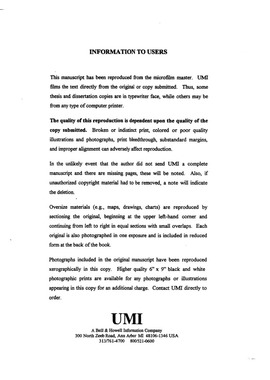| dc.contributor.advisor | Lancaster, E. L., | en_US |
| dc.contributor.author | Brown, Helen Huntley. | en_US |
| dc.date.accessioned | 2013-08-16T12:29:34Z | |
| dc.date.available | 2013-08-16T12:29:34Z | |
| dc.date.issued | 1997 | en_US |
| dc.identifier.uri | https://hdl.handle.net/11244/5452 | |
| dc.description.abstract | Each weekly session was video-taped. Written observations by the researcher were organized under these headings: amount of dialogue between the researcher and student, the student's interest in the workbook activities, indications of the student's individual thinking, effectiveness of the practice journal, evidence of the student's trust in the researcher, evidence of transfer of the student's acquired knowledge to subsequent musical problems and the assessment of the number of activities and time allowed for their completion. | en_US |
| dc.description.abstract | Recommendations for further study included a comparative study encompassing a longer period of time, a similar study for average-age beginning piano students in independent studios, a study comparing two groups of high school senior keyboard students to determine if the group using the workbook activities were better prepared for college music study, and a similar study to test the effect of including music history and theory in the study of voice and other instruments at the college level. | en_US |
| dc.description.abstract | A workbook designed by the researcher was used with three selected students in a case study approach during the first nine weeks of the Fall, 1996 semester at William Jewell College. The workbook activities were designed to follow the six stages of Bloom's (1956) taxonomy. The workbook included activities to be completed at each weekly session and assignments to be completed during the week such as comparing keyboard music of the four periods, critiquing performances, editing untitled scores, preparing repertoire without outside help, and evaluating individual progress through the use of a practice journal. The activities were the same for all three students, although the repertoire was designed to fit early-intermediate, late-intermediate and advanced performance levels. | en_US |
| dc.description.abstract | The purpose of this study was to determine the effectiveness of specific activities in music history and music theory on raising selected college freshmen students' skills at thinking critically about: (a) The relationship of the knowledge of music history and music theory to developing the critical thinking skills necessary for effective keyboard performance. (b) Personal growth and confidence as a performer. | en_US |
| dc.format.extent | ix, 221 leaves ; | en_US |
| dc.subject | Music Instruction and study. | en_US |
| dc.subject | Music theory | en_US |
| dc.subject | Piano Instruction and study. | en_US |
| dc.subject | Psychology, Cognitive. | en_US |
| dc.subject | Education, Educational Psychology. | en_US |
| dc.subject | Education, Music. | en_US |
| dc.subject | Critical thinking. | en_US |
| dc.subject | Music History and criticism. | en_US |
| dc.title | The application of music history and music theory in keyboard study to facilitate the development of beginning stages of critical thinking. | en_US |
| dc.type | Thesis | en_US |
| dc.thesis.degree | Ph.D. | en_US |
| dc.thesis.degreeDiscipline | School of Music | en_US |
| dc.note | Source: Dissertation Abstracts International, Volume: 58-02, Section: A, page: 0408. | en_US |
| dc.note | Major Professor: E. L. Lancaster. | en_US |
| ou.identifier | (UMI)AAI9722341 | en_US |
| ou.group | Weitzenhoffer Family College of Fine Arts::School of Music | |
